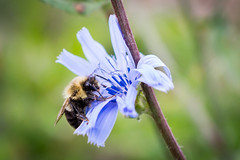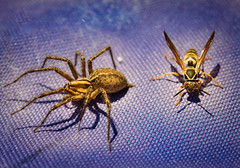Grass Hopper
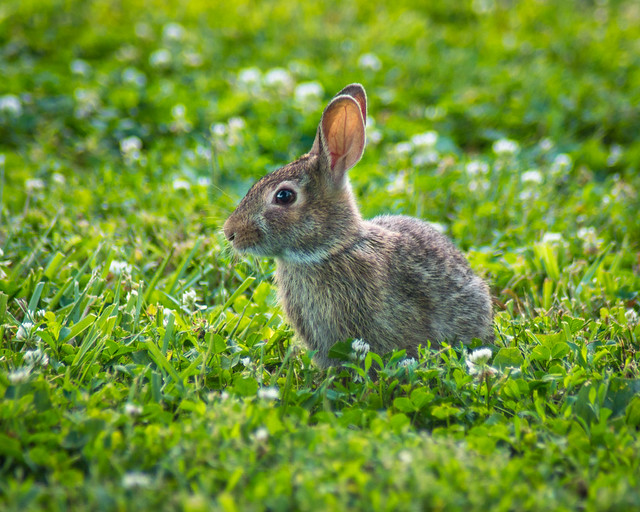
This little rascal was very alert, keeping an eye on me while I kept my camera focused on him.
I photographed this wild bunny on a recent trip to Missouri. I was strolling around in the early morning and found out I wasn’t the only one up early. He looks steady here, but he only stood still for a moment before scurrying off to the woods.
You can view more of the detail and the twinkle in his eye by clicking on the photo. When you do, a larger version will open in a new browser tab.
Hello Wild Yellow
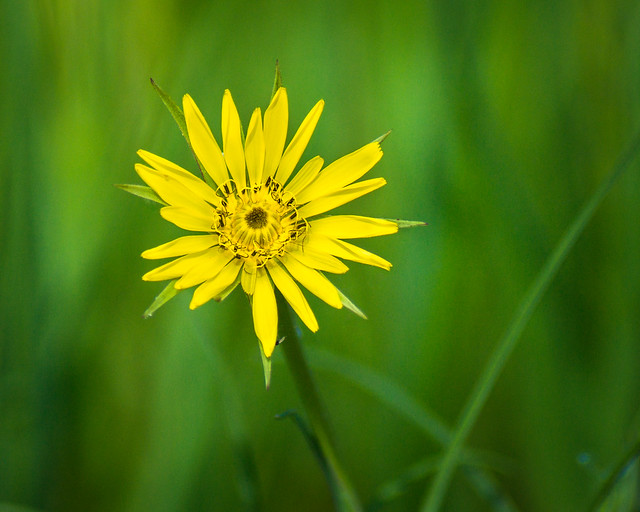 This yellow wildflower found a place in a woodland clearing to enjoy the warm, afternoon sun.
This yellow wildflower found a place in a woodland clearing to enjoy the warm, afternoon sun.
I usually try to offer some info on the flowers I post – at least the name of the flower. In this case, I don’t know what this one is called. I spent a good deal of time searching the web and a wildflower field guide but couldn’t come up with a good match. If you know, definitively, what this flower is, let me know. I photographed this bloom on a trail in northeast Wisconsin.
Update: With the help of some online friends I’ve discovered this flower is known locally as Goat’s Beard. Wikipedia also lists a variety of other names that are used for this plant…Tragopogon dubius, yellow salsify, western salsify, western goat’s-beard, wild oysterplant, yellow goat’s beard, common salsify and salsify.
You can get a larger, more detailed view of this flower by clicking on the photo.
All of the photos I post are available for purchase. If you’d like to buy one, click on the blue “Buy this Online” bar below for a variety of print and frame options or contact me for digital purchase and licensing options.
Dark Damsel
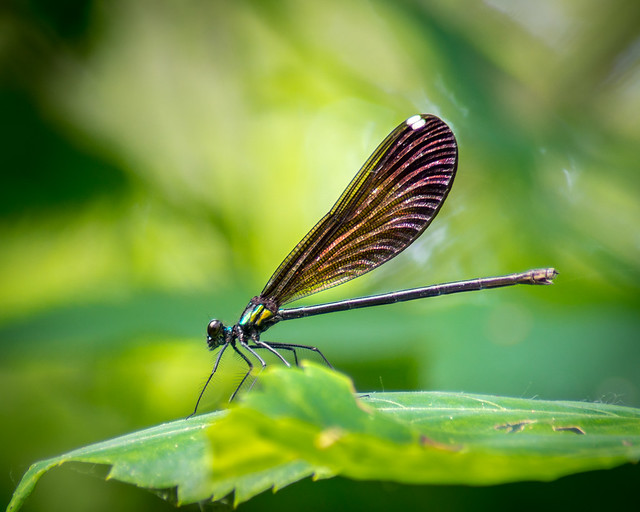
The dainty damselfly is a predator by nature. Damselflies catch and eat flies, mosquitoes, and other small insects. Often they hover among grasses and low vegetation, picking prey off stems and leaves with their spiny legs.
I think the best part of this image is the detailed pattern and color in the wings. I also like the tiny spines on the legs.
This dark damsel paused just long enough for me to catch a good photo. They tend to zip to and fro and make focusing a challenge. I saw this one on a walk through some woods in Missouri. I had to shoot through the leaves to grab this image. I would have preferred the leaf in the foreground wasn’t there so you could see the structure of all the legs, but sometimes you have to take what you can get.
To enjoy the details available in this image, click on the photo and a full-screen version will open in a new browser tab.
All of the photos I post are available for purchase. If you’d like to buy one, click on the blue “Buy this Online” bar below for a variety of print and frame options or contact me for digital purchase and licensing options.
Sunrise and Splendor
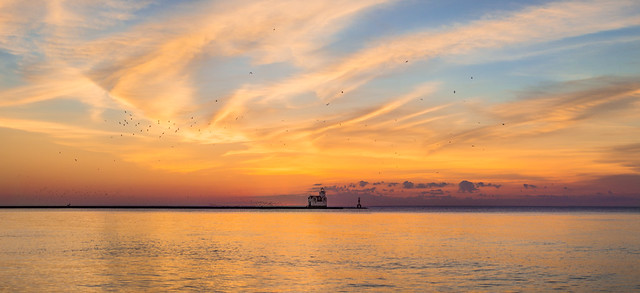
A magnificent, pre-sunrise, panoramic display by the morning sky and clouds seems to envelop the Kewaunee lighthouse and pier. The warm reflection off Lake Michigan’s calm waters only accentuates the exhibition.
I’ve always believed, the best part of a sunrise is not the sun, but the clouds. The sun creates the light and color, but the clouds provide the character. Not heavy cloud cover, but the light, wispy kind that provide natural texture and interest to a scene. To me, a cloudless sunrise is pretty bland.
It seems I’ve been writing a lot about how I don’t often post panoramic images because their wide-view perspective doesn’t fit well within the typical web site parameters. Well, I must be on a bit of a panoramic kick these days, because I’ve posted more panoramas in the last few weeks than I have in as many years. I guess, when the mood and the beauty hits me, I can’t pass it up. It’s a little more work in processing, but I believe the results are well worth it.
Of course, when I post a panoramic image I must urge you to click on the photo so you can view a much larger version. There are a lot of birds in this photo, but you’ll miss most of them if you don’t view the larger version. Again, just click on the photo and a full-screen version will open in a new browser tab.
All of the photos I post are available for purchase. If you’d like to buy one, click on the blue “Buy this Online” bar below for a variety of print and frame options or contact me for digital purchase and licensing options.
Gold In the Marsh
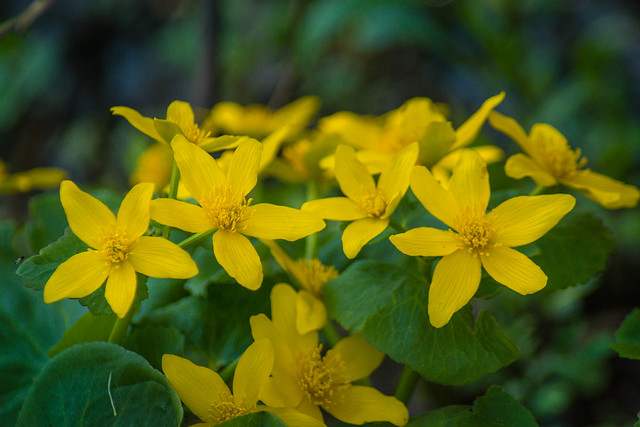
These yellow wildflowers are known locally as Marsh Marigolds. They can be found in ditches, wet woodlands and marshes. We found these…and a whole bunch more…in some soggy areas in the woodlands of northeast Wisconsin.
As I mentioned, we call them marsh marigolds in this area. Their botanical name is caltha palustris but they are known by a unbelievable variety of other names around the world. According to Wikipedia, the second most common name is kingcup. After that, they are also called brave bassinets, crazy Beth, horse blob, May blob, mare blob, boots, water boots, meadow-bright, bullflower, meadow buttercup, water buttercup, soldier’s buttons, meadow cowslip, water cowslip, publican’s cloak, crowfoot, water dragon, drunkards, water goggles, meadow gowan, water gowan, yellow gowan, goldes, golds, goldings, gools, cow lily, marybuds, and publicans-and-sinners. The common name “marigold” refers to its use in medieval churches at Easter as a tribute to the Virgin Mary, as in “Mary gold”.
All of the photos I post are available for purchase. If you’d like to buy one, click on the blue “Buy this Online” bar below for a variety of print and frame options or contact me for digital purchase and licensing options.
Out of the Blue
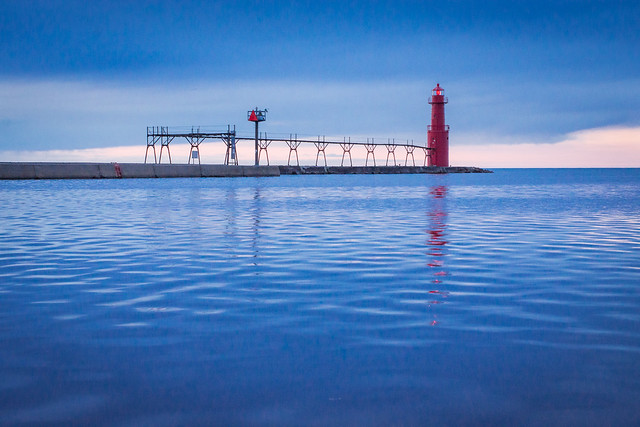
The deep red color of the Algoma lighthouse stands in sharp contrast to the deep blue of Lake Michigan and the early morning sky above.
I have taken a lot of photos of this lighthouse. On this trip, I was hoping for another nice sunrise. Unfortunately, the rising sun was concealed by a band of clouds on the horizon so a true sunrise photo wasn’t in the cards. I decided to catch a low angle view of the lighthouse across the Algoma harbor. To get this shot, I crawled down on the rocks near the mouth of the Ahnapee River, just off the marina parking lot, and held my camera just above the water.
I like this image for 1) the different perspective, 2) the reflection of the lighthouse, 3) the ripples in the water giving it depth and interest, and 4) the predominant blue color with contrasting red.
All of the photos I post are available for purchase. If you’d like to buy one, click on the blue “Buy this Online” bar below for a variety of print and frame options or contact me for digital purchase and licensing options.
Interloper
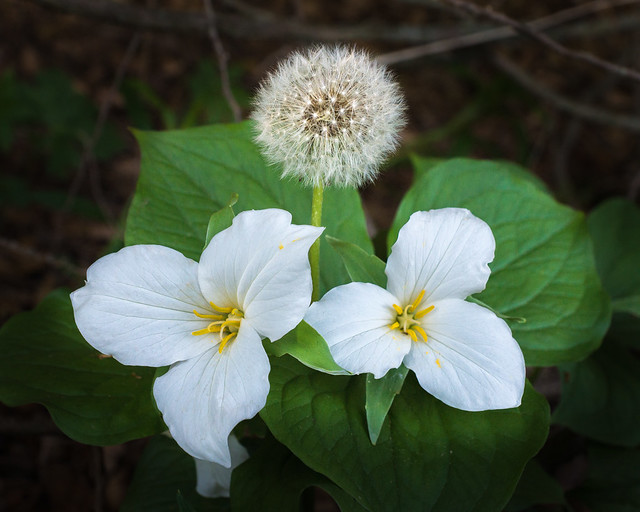
in·ter·lop·er
The dandelion is clearly the interloper here, inserting itself among the trilliums. These wildflowers were photographed on a recent hike in the woodlands of northeast Wisconsin.
I tried to capture the purity and details in the petals of the trillium blooms. The dandelion seemed to be photobombing. If you look closely, I think you can see a sly smirk on the dandelion’s face.
In any case, you can see all of the detail better by viewing the larger version. To do that, simply click on the photo.
All of the photos I post are available for purchase. If you’d like to buy one, click on the blue “Buy this Online” bar below for a variety of print and frame options or contact me for digital purchase and licensing options.
Tall Drink of Comfort
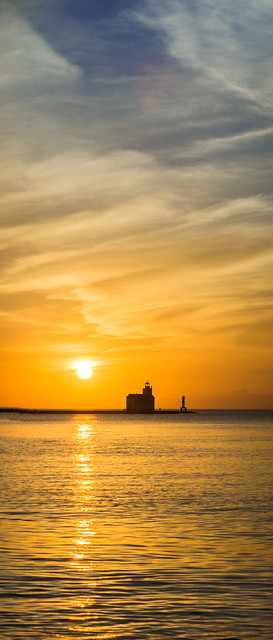 The sky above, the water below and the sun rising over its shoulder all combine to make a warm, comforting atmosphere around the Kewaunee, WI lighthouse. This image was captured on the western shore of Lake Michigan, just south of the pier in Kewaunee.
The sky above, the water below and the sun rising over its shoulder all combine to make a warm, comforting atmosphere around the Kewaunee, WI lighthouse. This image was captured on the western shore of Lake Michigan, just south of the pier in Kewaunee.
This is a panoramic image. Usually we think of panoramas as being wide, horizontal images. In this case, I wanted more of the sky and water in the shot than a single frame would allow, so I combined three frames (high, middle and low) to create a tall image. The changing hue in the upper sky adds to the interest of this image, as does the sun’s reflection dancing along the ripples of the lake.
As I’ve said before, I don’t normally post many panoramas because they don’t display well within the size constraints of most webpages. This one would be truly awesome if you could view it very large. It is a large file and could be printed as tall as eight feet. Wouldn’t that would be cool!
You can click on the image to view a larger version but, again, because of webpage constraints, you won’t see a much larger image.
All of the photos I post are available for purchase. If you’d like to buy one, click on the blue “Buy this Online” bar below for a variety of print and frame options or contact me for digital purchase and licensing options.
The Daffodil Patch
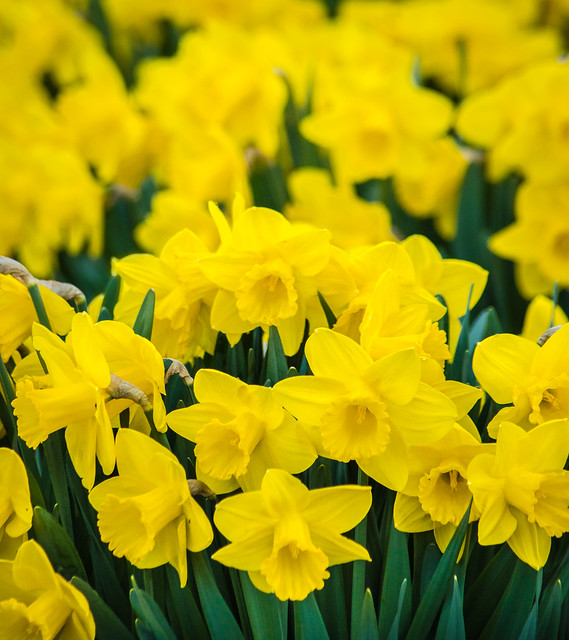 Daffodils are always a cheerful delight. Though short-lived, they are bright and vigorous springtime bloomers.
Daffodils are always a cheerful delight. Though short-lived, they are bright and vigorous springtime bloomers.
This particular patch is one of my favorite. Each spring, those driving north through Algoma,WI on highway 42 will find this plentiful display of yellow daffodils on the right side of the road, just before you descend the hill on the south side of town. My thanks and compliments to the homeowner who provide these well-cared-for beauties.
The daffodil is of the Narcissus genus – predominantly spring perennial plants in the Amaryllidaceae (amaryllis) family. Those in the Narcissus classification are easy to identify by their flowers with six petal-like tepals surmounted by a cup- or trumpet-shaped corona. According to Wikipedia, historical accounts suggest narcissi have been cultivated from the earliest times, but became increasingly popular in Europe after the 16th century and by the late 19th century were an important commercial crop centered primarily on the Netherlands. Today narcissi are popular as cut flowers and as ornamental plants in private and public gardens.
Like other members of their family, narcissi produce a number of different alkaloids, which provide some protection for the plant, but may be poisonous if accidentally ingested. This property has been exploited for medicinal use in traditional healing and has resulted in the production of galantamine for the treatment of Alzheimer’s dementia. Long celebrated in art and literature, narcissi are associated with a number of themes in different cultures, ranging from death to good fortune, and as symbols of spring. The daffodil is the national flower of Wales and the symbol of cancer charities in many countries.
You can view a larger version of this image by simply clicking on the photo.
All of the photos I post are available for purchase. If you’d like to buy one, click on the blue “Buy this Online” bar below for a variety of print and frame options or contact me for digital purchase and licensing options.
Fully Charged
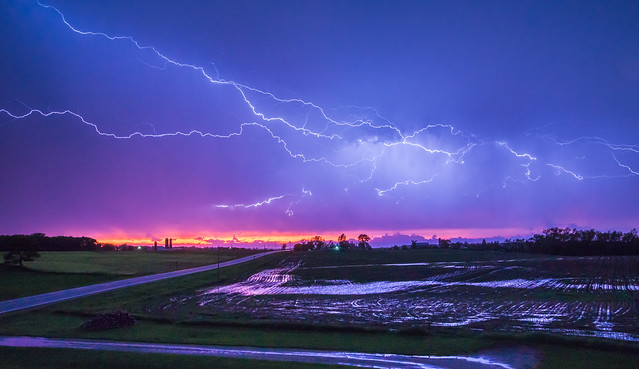
Lightning lit up the sky as a post script to the powerful storm that just rolled through our rural area of Kewaunee County in northeast Wisconsin.
A severe storm had just pushed through. On the horizon, the sky turned a wild, orangeish-red and the lightning continued to flash for awhile. I’m afraid I was a little late to the party. I should have gotten my camera out sooner. I was able to capture three shots with lightning – this, being the best one.
In the foreground you see the farm field, planted with corn in its early stages, soaked with water that reflects the brightness of the lightning. This shot was taken from a third-floor vantage point in the attic or our home. Very cool to watch.
This is one you’ll want to view in the larger version to see the fine detail in the lightning. You can do so by clicking on the image.
All of the photos I post are available for purchase. If you’d like to buy one, click on the blue “Buy this Online” bar below for a variety of print and frame options or contact me for digital purchase and licensing options.







